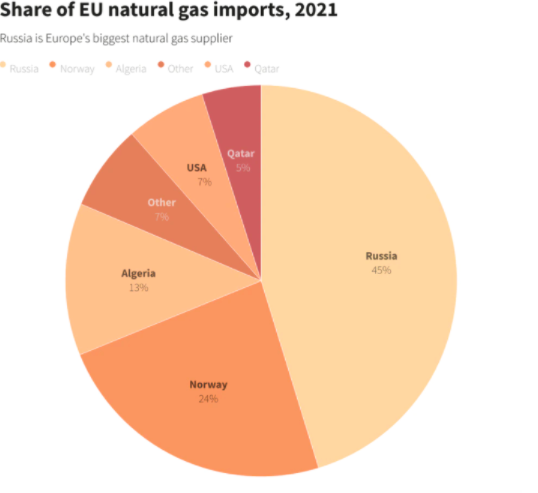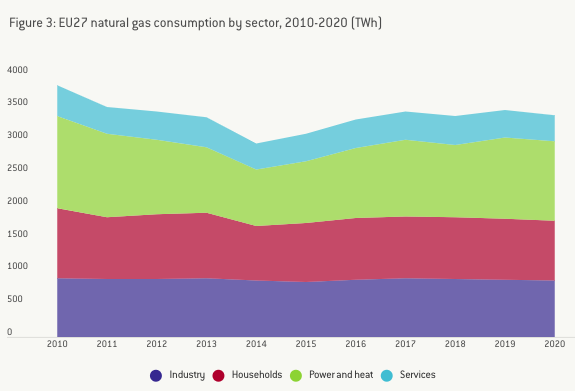EU aims to boost gas supplies and reduce reliance on Russia

All members of the European Union (EU) will have to collectively ensure gas stores are 90 per cent full by October each year, according to proposed rules set to be announced next month by the European Commission (the Commission).
This follows gas prices spiking to record highs this winter – with Gazprom cutting export growth into the continent amid rebounding post-lockdown demand.
Russia’s invasion of Ukraine has encouraged the EU to devise ways to reduce its dependency on Kremlin-supported fossil fuels.
The trading bloc relies on Russia for around 40 per cent of its natural gas, alongside a quarter of its oil and half of its coal.
As it stands, the European Union’s gas stores are only 26 per cent full – with Gazprom flows dwindling to near decade lows last month.
The EU has chiefly staved off blackouts and supply shortages over the winter through top-ups in liquefied natural gas imports from the US – alongside the good fortune of milder than expected weather.

Country leaders are also expected to call for all EU nations to start refilling gas stores to prepare for next winter and provide a buffer against supply shocks at a summit next week.
While the EU did not join the UK and US in imposing sanctions on Russian energy last week – the Commission is set to publish a detailed plan in May for EU countries to drop Russian gas, oil and coal by 2027.
This includes a large increase in LNG imports and tripling EU wind and solar energy capacity by 2030.
Germany has already committed to boosting LNG supplies and is open to slowing down its phasing out of coal, while France is committed to significantly ramping up its nuclear power programme over the coming decades.
It has also suspended the approval process for Nord Stream 2, which would have doubled gas flows between both countries.
Although EU nations have rallied behind the aim to abandon Russian fossil fuels, the bloc remains split over whether to sanction Russian oil and gas.
Germany and Hungary still oppose energy sanctions – fearing economic damage – while Poland and Latvia are concerned the hundreds of millions of euros Europe sends Russia per day for energy supplies is financing the war.

Reflecting the dilemma, European think tank Bruegel has estimated that the cost of cutting itself off from Russian gas this winter could total €100bn.
However, Bruegel has also calculated that the amount of money Europe pays to Russia each day could average $850m per day in the first half of 2022.
Its latest report suggested demand would have to significantly fall alongside maximising non-Russian gas supplies
Bruegel said:”The EU cannot simply rely on increasing supply to replace Russian natural gas volumes. Demand will have to play a role as well. Only a combination of the two can deliver a workable outcome.
This stance was echoed by UBS – which estimated that drop offs in Russian gas would require consumers to use considerably less energy.
Meanwhile, Kremlin-backed gas giant Gazprom revealed today that natural gas exports outside former Soviet Union countries fell 28.5 per cent year on year to 30.7bn cubic metres in the period from 1 January to 15 March.
This follows a section of the Russian Yamal-Europe pipeline resuming eastbound gas delivery to Poland from Germany, after normal, westbound supplies earlier in the morning, according to data from German network operator Gascade.
The pipeline has not been providing sustained supplies to Germany since December.
Trading bloc unveils French-led fuel subsidy plans and loans for businesses
French Finance Minister Bruno le Maire has revealed European Union (EU) finance chiefs have agreed to subsidise fuel prices and offer support to companies hit by surging energy prices following Russia’s invasion of Ukraine.
Speaking at a news conference today, he said: “This war in Ukraine is leading to a sharp increase in the price of commodities, particularly gas and food. This calls for a coordinated economic response by European states.”
le Maire revealed the joint strategy was based on European Commission proposals to ease curbs on EU state aid to help deal with the current crisis facing energy users on the continent.
The measures would include support for all households hit by a sharp rise in fuel prices with discounts at the pump and loans for companies that consume a lot of energy.

France has already announced a subsidy of 15 cents per litre of fuel – which will come into effect from April.
European Commission Vice President Valdis Dombrovskis said EU countries could finance the investment from very cheap loans available under the EU’s recovery fund, which remained untapped.
Dombrovskis told the conference: “There is still €200bn available in loans that member states can request up to August 2023 to finance more investment and reforms.”
le Maire also confirmed the trading bloc is determined to diversify its energy sources to become independent of Russia – its biggest energy supplier which provides around 40 per cent of its natural gas – alongside more than a quarter of its oil and half its coal.
The minister said: “We have to construct our energy independence as soon as possible. We have to speed up investment, we have to diversify sources of energy, we have to diversify supply sources, we have to build up stocks.”
For all the latest Lifestyle News Click Here
For the latest news and updates, follow us on Google News.

